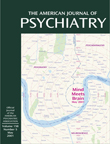Dr. Lawrence C. Kolb: One Student’s Recollection
I think the psychiatry residents where I work are terrific. This is no accident. Many hours are spent sifting through applications from the top graduates of medical schools, examining the best of them with three probing interviews, and then discussing each of them in long committee sessions. The process is a lengthy one, and applicants are not informed of the outcome for many months.
I recall a different application experience in the 1960s. At the beginning of a medical internship in Boston, I decided to become a psychiatrist. I applied to the Columbia University program in which I had been a medical student. As directed in the application, I requested that my medical school transcript and the dean’s letter summarizing my clinical performance be sent to the training director. I also made an appointment for an interview with him early in October 1959. Because of ignorance of the system rather than grandiosity, this was the only application I completed.
I do not recall the content of my official interview that day. I do recall that the entire proceeding lasted no more than 20 minutes and that the training director was a rather formal but totally pleasant man. At the end he shook my hand and said, “Let me see if I can get you in to see Dr. Kolb right now.” He knocked on Dr. Kolb’s door and poked his head in. “I have a nice young man who wants to be a psychiatrist.” Then to me, “Go right in.”
Dr. Lawrence C. Kolb, professor and department chair, was in shirtsleeves behind a large desk writing on a yellow legal pad. At the time, it didn’t strike me as unusual that I spent the entire interview standing at something close to attention. He continued writing for 5 minutes, concentrating fully on his efforts. (Probably the next edition of his famous textbook, I thought.)
He put down his pencil and looked up. “So, Druss, what did you do at medical school when you weren’t studying?” he asked.
“I sang in a madrigal group and played four-wall handball.” He seemed vastly more interested in the latter and asked me about it.
“It’s like squash,” I replied, “but you use both hands instead of a racquet. And the ceiling is in-bounds.”
He thought about this for a moment and then asked, “What does it take? Speed? Strength? Endurance?”
“None of the above, Dr. Kolb. You have to know the angles,” I said.
“That sounds like just the right preparation for doing psychiatry. Miss Neubart, my administrator, will give you a contract. Sign it before you leave.”
He went back to his writing, and after a few minutes, I gathered I had been dismissed. That was it. I went out, signed the contract, dated it July 1, 1960, and was thereby launched on my career.
I saw a great deal of Dr. Kolb over my 3 years of psychiatry residency, at the least, weekly at his meeting with residents. He was a hands-on chief and, as an old Navy man, very much captain of the ship. Dr. Kolb spoke with deeds, not words. When any member of the Psychiatric Institute staff was hospitalized at Presbyterian Hospital—from the elevator driver, to a resident, to a colleague—he would visit the staff member personally in the hospital.
It was 4 years after my terse admission interview that I had a second pivotal encounter with him. By then I was in the army at Colorado Springs. I was working on my first scientific paper, “Foreign Marriages in the Military,” and felt I needed someone to check it over before I sent it off for publication. There was no one at Fort Carson who was able to do this, so I had the audacity to mail it to one of the busiest, most eminent psychiatrists in the country, Dr. Lawrence Kolb. In the 1960s not only was he chair of his department, but successively president of the APA and president of the American Board of Psychiatry and Neurology. I recall writing him that although this was my first effort at preparing an article for publication, I was sending him my fourth revision.
I am not sure I even expected a reply, or, if one would be forthcoming, I was sure it would be months away. Yet virtually by return mail, I received a manilla envelope from New York City:
Captain Richard G. Druss, M.C.
U.S. Army Hospital
Mental Hygiene Consultation Service
Fort Carson, Colorado
Dear Dick: I would never dream of submitting a paper of my own without at least nine revisions.
Sincerely L.C.K. [signed]
Along with the letter was my manuscript, which he had covered with red-inked corrections. There were corrections of spelling, grammar, rhetoric, and sentence structure; suggestions for commission as well as omission; marginalia inviting reordering of ideas; and at least five references from the current literature. There was even a suggestion of where to send it when I had “fixed it up”: The Psychiatric Quarterly. What a careful and caring job he had done. There was more red ink from his pen than black ink from my typewriter.
I did fix it up, and it was eventually accepted, as he prophesied, by The Psychiatric Quarterly.
What a privilege it was to have been one of Dr. Kolb’s students.
Address reprint requests to Dr. Druss, 180 East End Ave., New York, NY 10128.



